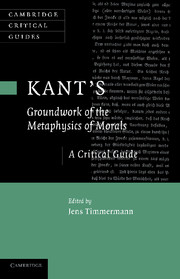Book contents
- Frontmatter
- Contents
- List of contributors
- List of translations and abbreviations
- Introduction
- 1 Ethics and anthropology in the development of Kant's moral philosophy
- 2 Happiness in the Groundwork
- 3 Acting from duty: inclination, reason and moral worth
- 4 Making the law visible: the role of examples in Kant's ethics
- 5 The moral law as causal law
- 6 Dignity and the formula of humanity
- 7 Kant's kingdom of ends: metaphysical, not political
- 8 Kant against the ‘spurious principles of morality’
- 9 Autonomy and impartiality: Groundwork III
- 10 Problems with freedom: Kant's argument in Groundwork III and its subsequent emendations
- 11 Freedom and reason in Groundwork III
- Bibliography
- Index
5 - The moral law as causal law
Published online by Cambridge University Press: 04 August 2010
- Frontmatter
- Contents
- List of contributors
- List of translations and abbreviations
- Introduction
- 1 Ethics and anthropology in the development of Kant's moral philosophy
- 2 Happiness in the Groundwork
- 3 Acting from duty: inclination, reason and moral worth
- 4 Making the law visible: the role of examples in Kant's ethics
- 5 The moral law as causal law
- 6 Dignity and the formula of humanity
- 7 Kant's kingdom of ends: metaphysical, not political
- 8 Kant against the ‘spurious principles of morality’
- 9 Autonomy and impartiality: Groundwork III
- 10 Problems with freedom: Kant's argument in Groundwork III and its subsequent emendations
- 11 Freedom and reason in Groundwork III
- Bibliography
- Index
Summary
A well-known gap exists in Kant's argument that the categorical imperative is the fundamental principle of morality. The gap is between the claim that rational agents act only on maxims that could serve as universal laws and the more substantial requirement contained in the categorical imperative. There does not appear to be any obvious route from the seemingly trivial requirement to conform to universally valid laws to the controversial and substantive requirement of acting only on maxims that one can at the same time will that all other rational agents act on. Kant apparently assumed that we conform our wills to universally valid laws only if we act on maxims that we can will to be universal laws, but many have pointed out he gives no defence of this assumption. In what follows, I focus on a preliminary step to connecting the two claims, the step that connects rational agency to conformity to universally valid laws. Why must the will of a rational agent, insofar as he is rational, be such that it is universally valid in any sense? My hope is that by first considering this question, some light can be shed on the nature of the remaining argument for the categorical imperative.
Many readers assume that for Kant, a rational agent must conform to universally valid laws because rational agency is rational, and rationality requires this sort of universal validity.
Keywords
- Type
- Chapter
- Information
- Kant's 'Groundwork of the Metaphysics of Morals'A Critical Guide, pp. 82 - 101Publisher: Cambridge University PressPrint publication year: 2009
- 1
- Cited by

